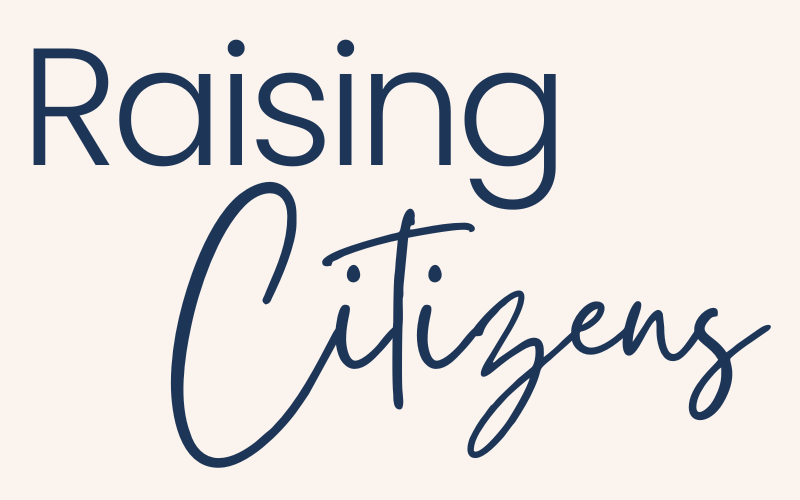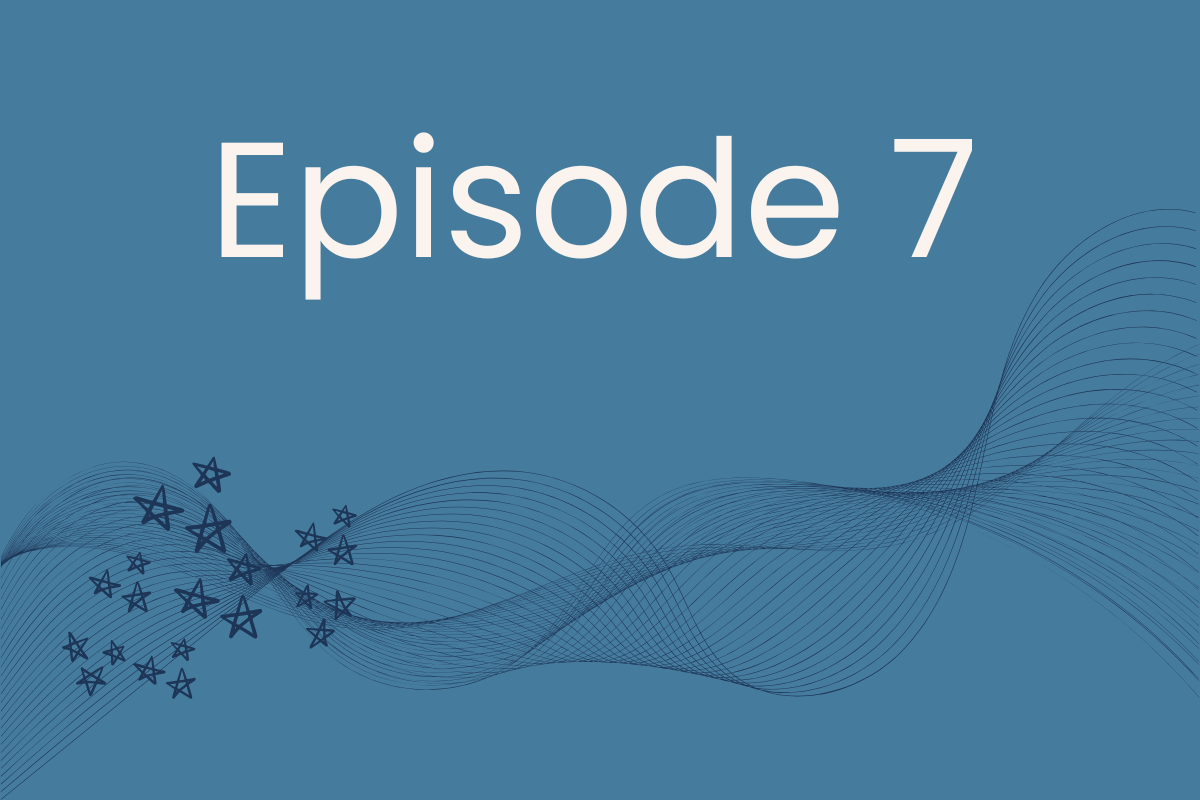Listen
Notes
1968 DNC – Enjoy the rabbit hole!
Transcript
Hey there! Welcome to Raising Citizens. We’ve got a world where social studies is shrinking, but over here, we’re expanding it. This is your guide to helping kids make sense of the world. One concept, one routine, one small change at a time. I’m your host, Meghan Dyer Pavs, a former teacher and a current mom.
Let’s jump in!
Welcome to the Raising Citizens podcast where today we are raising citizens on challenge mode. So, I launched Raising Citizens on Instagram and on Uh, the website and all that kind of stuff, uh, back at the beginning of October. And then we had an election and, um, that was not really what I was thinking would happen.
Read More
Uh, ah, so, um, I’m not gonna get too deep into my predictions for what I think is gonna happen or, uh, my reactions or anything like that. I said more than three sentences to a friend, you know, on, uh, Wednesday or Thursday or whatever last week. And I scared her so badly that she came the next day with four pints of Ben and Jerry and an orchid.
So, um, I will just say I believe that he is going to do what he promised he would do. And I believe that the system of consequences is probably going to work about as well as it has so far, which is To say he is the president elect. So that’s all I’m going to say about that. But, um, no, I did not start raising citizens as like a preemptive resistance thing because I predicted that this was going to happen.
I’m probably not going to talk very much about it. Real time things that are happening with this administration. There are a zillion other podcasts and places where you can get that information that will cover what’s happening and why, and the implications and how far outside precedent is and all that kind of thing, but, um, part of what was hard about the first administration was the chaos and the distraction and the adrenaline and cortisol rush that came from kind of staying on your toes all the time and never know what was coming down the pipe.
And so that’s not. really the goal of Raising Citizens in the podcast. Um, the goal is more to be a long term solution and not a crisis response. So in this podcast, I want to try to be careful that we’re not latching onto things just because they’re emotionally fiery. There’s a lot of slow, boring systems and Frameworks and things that are still really important that I would like to dive into, you know, things that fall into that important but not urgent quadrant of the priority matrix.
All that to say, also, we kind of already were raising citizens on challenge mode. You know, this might be like challenge mode plus, but the reason why I started raising citizens is because we were Already facing a number of challenges that some of which have been talked about a lot, and some of them might not be quite as obvious or front and center, but like, you know, you have a crisis of loneliness and identity and belonging from kids, like basically as long as young, as they’re able to answer survey questions, you have an economy that requires both parents to work and an insufficient childcare capacity, particularly over the last four or five years.
But It has long, for like 10 years or more, been the case that you had to put your name on a list before you were even pregnant. You have technology that’s now creating two ladders of maturity that we now have to manage. So you have the real world. Levels and rungs and then you have the digital world. So parents have like these double decisions about like, Are you ready for solo playdates?
Are you ready for sleepovers? Are you ready for a phone? Are you, which phone apps are you ready for? How far can you walk in the neighborhood? How far can you bike? And all that kind of stuff is just kind of, technology has doubled that and complicated it in some ways. You have a workforce that’s changing so quickly that half the jobs that you look at now You couldn’t have even explained to your high school self at the time.
So career prep for kids and asking kids what they want to be when they grow up is like impossible. You have habits of visiting and seeing people in person that is basically non existent outside of school and work. Um, there’s just, you also have, you know, a media environment that is completely different from when I am old enough to remember when we still had a TV that you could only click to like.
20 channels or whatever, and they were a click dial on the actual TV. Um, so things were already filtered through fact checking and institutionalized and there were, you know, good things about that and bad things about it, but it was simpler for sure. It was less complicated. And now of course you have a zillion other media platforms in addition to being able to search just literally anything you want to on the TV.
So there’s just a lot of challenges that we are looking at that kids need to be more prepared and more flexible than they have been either way, regardless of which way the election went, we, there’s, there’s a lot that we need to work on. So, um, Looking ahead, you know, what are we going to do about raising citizens on challenge mode?
We’re going to do self care. We’re going to keep ourselves sane. And when I talk about self care, I’m not talking about like the massages and facials and manicures side of things. I’m talking about like the toddler care style, the like relentless aerobic version of like, did you eat enough? Did you sleep enough?
Did you eat enough vegetables? Have you run around enough? You know, we’re going to do some current events in our house still, but There’s the more emotional ones. We’re just gonna You know, maybe sit on those for a couple days and work out our own emotions, meditate before we bring those to the kids. Um, we’re not going to lie to our kids.
We are, I might say we need to talk about that in a couple of days or I’m not ready to talk about or let me think about how I’m going to explain that, but I’m not going to lie to them. And actually as I’m looking at this list of things, like this is just, this is also the rules, like the unofficial rules of grief, like you maintain routine, you make sure that you’re being honest with them and you, um, make sure that you explain things to them.
So, uh, yeah, we’re going to use the rules of griefs there. Um, and then I also, I ordered a physical copy of the, uh, National Social Studies Standards because, um, I think that that is a really well thought out document that I’m going to continue to draw from. Either way, and you know, make sure that I have that in physical copy so that it is available to us.
So that is raising citizens on challenge mode and on super challenge mode. So I hope you stick with us as we figure this out together moving forward. And now it’s time for a segment we’re going to call His Story Time. And today’s story is about the 1968 election season. Wow, what a doozy. I had fallen down this Wikipedia rabbit hole a little while ago, and then I came back to it.
It’s even deeper than I thought. So to start us off, we are heading into 1968. We’ve got LBJ as president, Lyndon B. Johnson. He had taken over the presidency in 1963 from JFK after his assassination. So he had done a piece of that term. Then he ran for reelection in 1964, won that, had his full, full term and was expected to run again in 1968.
So the New Hampshire primary comes up, the Democratic Party. McCarthy, Eugene McCarthy, who is not the same as Joseph McCarthy of McCarthyism, this is a different one, this is Eugene McCarthy, had decided to launch a primary against him in New Hampshire. But LBJ really didn’t campaign up there, it kind of was no big deal, and then all of a sudden the primary happens, and.
Johnson only won 49 to 42. So all of a sudden it’s like, whoa, McCarthy actually had a really good shot here. And that’s at the beginning of March. And because this is like obvious that challengers have a shot here, RFK, Robert F. Kennedy, the original one, not the brainworn one. So now it’s like the middle of March and RFK, who at the time was the attorney general, decides that he’s going to launch a campaign as well.
End of March. LBJ decides to pull out. So we’re at the end of March. It’s March 31st, election season. Now we’ve got two new candidates. Incumbent isn’t running anymore. About a month later, Hubert Humphrey, who was the VP, decides to run, the end of April. And so now there’s like primaries happening all over the place, but like people haven’t gotten, you know, like, You know, there’s some people are running in some states and some people are running in other states because the, the timeline to get on the ballots is a little bit different.
So not everybody’s on everything anyway. So you’ve basically got McCarthy, Kennedy, and Humphrey who are running. By the way, his name is Hubert Horatio Humphrey, which if you are looking to name a child, just want to Hubert Horatio Humphrey. You’ve got three people running June 4th. You’ve got the California primary and a couple other ones.
And California’s winner take all, RFK wins on June 4th. That puts him in second place. We’re still fairly early in the primary season. Although late for us now, like June is late. This is only two months later. RFK is assassinated walking out of his victory speech. So now you’ve got Hubert Humphrey is the clear favorite on this one.
He had already been in first and Kennedy that with California that put him in second. So Humphrey is going to be the one. There’s some other drama. You go to the 1968 convention. And also part of the reason why Johnson had, the main reason he had pulled himself out is because he was so unpopular with the Vietnam War happening, familiar.
So he had pulled himself out. So Humphrey is the candidate. It’s pretty simple once you get to the, um, you know, at the convention, aside from the fact that there’s the major protests and things, beatings that happened outside the convention center. And McCarthy, who is the anti war candidate, is not enthusiastic about this situation.
On the other side, with the Republicans, you’ve got Nixon running. He ends up being the Republican candidate who wins. But, um, he had been vice president under Eisenhower from 1953 to 1961. And then after they left office, he ran for governor of California in 1962 and lost and retired from public office and like angrily told everybody, this is going to be my last press conference.
And so that was back in 1962. Now 1968, all of a sudden he comes out and he’s like, yeah, I’m running for president. Turns out Reagan also ran that year, like we’re only in 1968. He didn’t end up winning until 1980. Also Nelson and Winthrop Rockefeller, both were advocate, were nominated at the convention. So Nelson actually launched a campaign and Winthrop’s the only time I think the brothers have competed against each other at the convention.
So Winthrop was. A favorite son from his state. So he didn’t actually run a campaign, but his state nominated him at the convention. So both of their names were on the ballot. And then, you know, after the first ballot, they were both off, but yeah, a lot of drama on both sides. And so, um, you go into the actual, then what actually happened, of course, is that, uh, Nixon won.
He beat Hubert Humphrey by only 500, 000 votes. And part of the reason why that happened is because George Wallace, who You may know from his fun segregationist antics, uh, ran as a third party for the American independent party and. Get this. Okay. So get this on George Wallace. Get this. So he ran as the American Independent Party.
The American Independent Party was formed in, on July 8th, 1967. So like immediately before the 1968 election. Fun fact about 1967 for George is that he had been governor prior to 1967. He couldn’t run for a second term because of term limits. So he ran his cancer riddled wife instead. With everybody knowing that she would be on the ballot, but he would actually do the governing.
She became the first female governor in January of 1967, and then died from cancer in May of 1967. Then, two months later, the American Independent Party is founded, and he is nominated for president from there. He won 13. 5 percent of the popular vote, which was like 9. 9 million. Anyway, if you think that we’ve got a lot of drama now, we do, but, um, 1968 was fun because you had a vice president running as the Democratic candidate because the incumbent president stepped down early, causing some chaos.
There was an assassination attempt and also an assassination and the Republican party ran a future criminal and it was spoiled by a third party vote. But that’s the fun story about 1968. Enjoy the Wikipedia hole. It’s really fun.
Thanks for listening to the podcast. If you’d like to help the podcast, you can give a rating or a review.
For show notes or to sign up for our email list, visit the website at raising-citizens.com. You can find me on Instagram to send me a message, @raising_citizens. Hasta luego!


